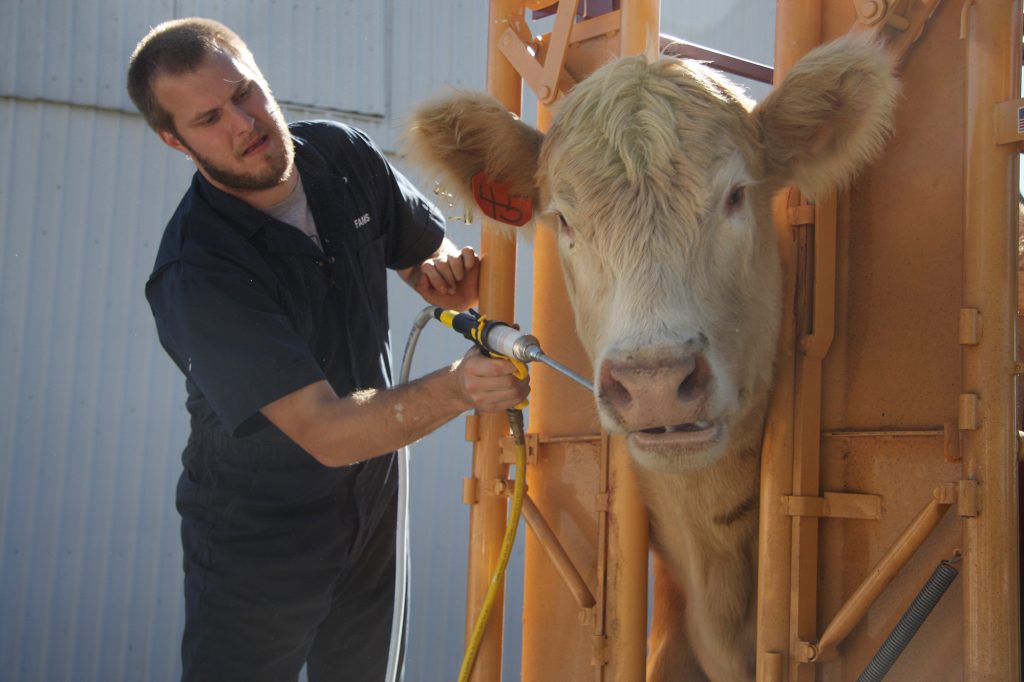Published 10/18/2023

The University of Missouri College of Veterinary Medicine recently secured $234,000 in funding from the United States Department of Agriculture National Institute of Food and Agriculture to develop educational resources for veterinarians and veterinary students interested in starting or acquiring a rural veterinary practice. The program, which will operate virtually, is a collaboration between the CVM, MU Extension and the Missouri Small Business Development Center. The goal is to provide learning opportunities to combat the shortage of veterinarians in rural communities.
Pamela Adkins, DVM, PhD, DACVIM, assistant professor of food animal medicine and surgery, is spearheading the project along with Craig Payne, DVM, director of veterinary medicine extension and continuing education outreach coordinator, and Laurie Wallace, DVM, DACVIM, adjunct associate teaching professor in veterinary medicine and surgery and director of veterinary online programs.
Payne says the idea for the program came from a conversation with a recent graduate in 2022. “This individual described the challenges they had when starting a new practice, specifically from the business aspect,” said Payne. “The primary challenge he had was not knowing where to find information or where to turn for help. He further mentioned that colleagues starting their own practices were contacting him for advice for the same reasons. We saw this grant as an opportunity for us to develop resources for veterinarians who are interested in starting a practice or buying into an existing practice in a rural community.”
Adkins said before the program launches, they will conduct focus group meetings with stakeholders. “In the early stages of the program, we plan to meet with recent graduates who are business owners to discuss the obstacles they faced,” said Adkins. “We hope this stakeholder meeting will help us make sure our planned program is appropriately addressing identified challenges.”
While the focus group will identify specific obstacles, known challenges include setting salaries as a practice owner, practice atmosphere, family issues and a shortage of personal time.
Adkins says there has been a dramatic decrease in the percentage of veterinarians who are interested in practice ownership due to a lack of business training and high educational debt. “It is well documented that practice ownership is one of the most reliable ways to increase pay if reasonable business practices are in place,” said Adkins. “Furthermore, ownership can allow for more control over the work environment, potentially leading to improved overall well-being. We hope that through educational opportunities we can provide knowledge, skills, and mentorship to rural and future vets to help them prepare for business startup and ownership, and down the line, enhance profitability and the well-being of rural veterinarians.”
The program will not only be available for all students at the CVM, but also to local veterinarians and recent graduates interested in rural practice ownership. Additionally, while the grant is supporting the program, participants will not be charged tuition for courses.
The timeframe for the program has not been finalized, but Adkins says they are hoping to get things moving quickly. “We plan to have our stakeholder focus group meeting this winter and want to hold our first webinar within the next six months,” said Adkins.
In the coming months, the team behind the program plans to advertise with hopes of drawing interest from students and local veterinarians. Adkins relayed the importance of the program and the passion of the team spearheading it. “Our team is committed to supporting our Missouri livestock producers and practicing veterinarians,” she said. “We hope to continue to build outreach programs that can ultimately benefit the livelihoods of both of these groups.”
By Nick Childress